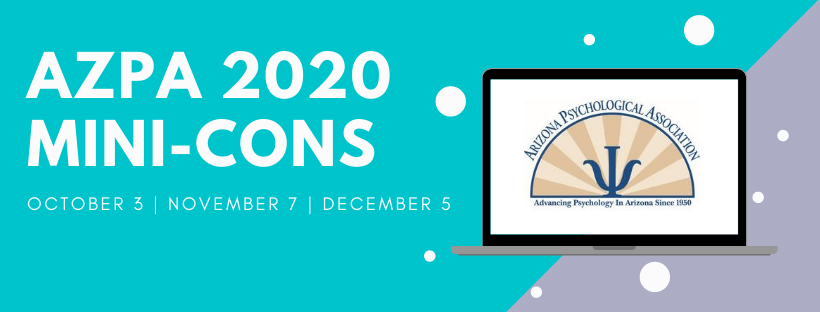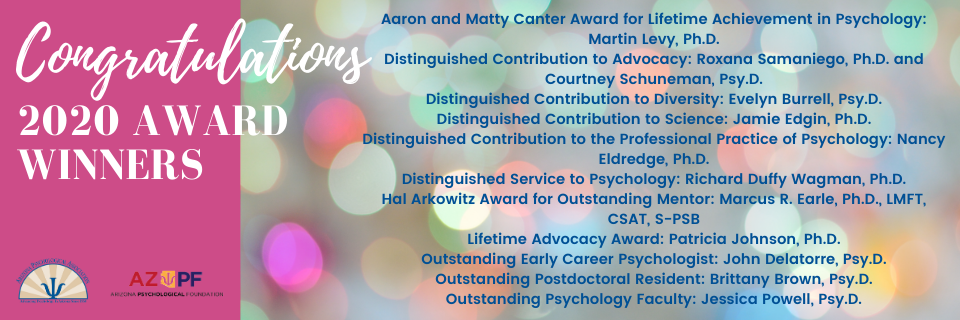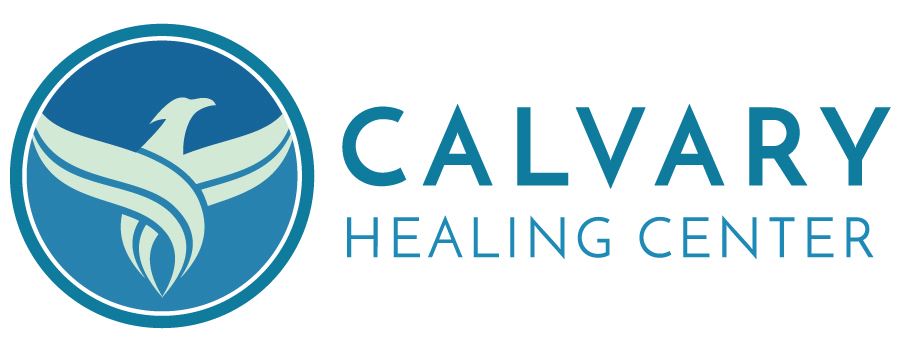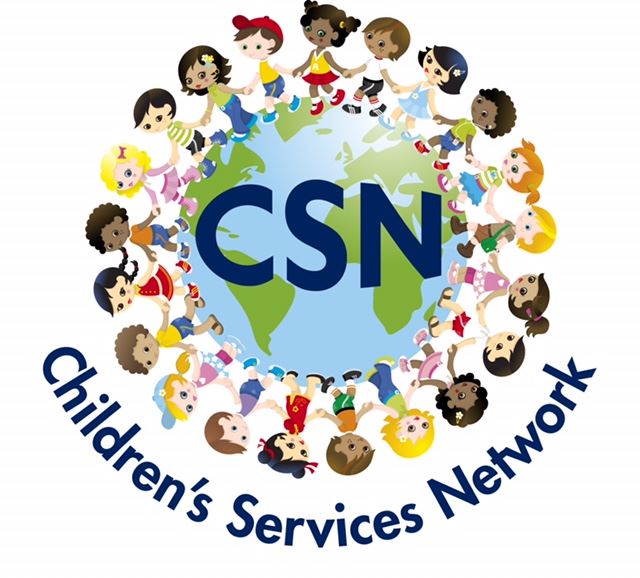| Arizona Psychological association |
- Home
- Mini-Cons
AzPA 2020 Mini-Con Series

AzPA is excited to deliver timely, first-rate education from skilled professionals for the 2020 Mini-Cons. This live event series will be delivered virtually to attendees via GoToMeeting platform on three Saturdays for your convenience: October 3rd, November 7th and December 5th. Up to 12 CE credits will be available for the entire series.
OCTOBER 3
9:00 – 11:00 a.m.: Responding to this Moment: Psychologists’ roles in ethically treating and evaluating Latinx immigrants and their families
Presented by Martha Ramos-Duffer, Psy.D.
Program Description:
In this presentation we will explore the latest research on the impact of changing immigration policy, family separation, layers of trauma, and sociocultural forces of oppression including xenophobia and racism on the mental health of Latinx individuals and families. We will learn to locate the experience of Latinx clients within the broader framework of oppression and the racial power structure of the United States. Acknowledging the ways that this is further complicated by COVID-19 and the backlash of this racial moment, we will identify ways that Psychologists can effectively respond through therapeutic interventions or providing psychological evaluations for immigration proceedings.
Specific culturally responsive and relevant research based treatment strategies will be identified and participants will learn to identify key context and data points to inform the selection and applications of tailored therapeutic responses. Often Psychologists will be contacted for help in evaluations for immigration proceedings. We will review current best practices in test selection, evaluation procedure, and report writing, taking into consideration ethical guidelines for forensic and culturally appropriate evaluation techniques, strategies, and approaches. We will discuss serving as an expert witness in immigration court and things to be aware of to honor ethical and moral obligations.
Through this presentation, participants will be equipped with knowledge and skills to respond meaningfully, therapeutically, ethically, morally, and compassionately to Latinx clients seeking therapeutic and assessment services while impacted by immigration policy.
Program Level: Intermediate
Learning Objectives:
1. Describe the psychological impact of current immigration policy and anti-immigrant sentiment on Latinx immigrant clients and their families.
2. Locate and discuss oppression faced by Latinx immigrants within the power structure of the United States and its psychological implications.
3. Identify culturally responsive therapeutic interventions to help clients navigate and heal from layers of immigration trauma, xenophobia, and racism.
4. Outline key ethical and culturally responsive considerations in conducting psychological evaluations for immigration proceedings.
5. Identify primary components of an ethical and effective psychological report for an immigration case.
11:00 – 11:30 a.m.: Break
11:30 a.m. – 1:30 p.m.: Why Blacks Resist Treatment: A Historical Perspective of Assault and Trauma
Presented by Evelyn Burrell, Psy.D.
Program Description:
The historical effects of racism on Blacks continue to have an extraordinary effect on the clinician-client relationship. Research suggests that Blacks experience difficulty with trusting mental health providers and may present as resistant to treatment. Clinicians may inadvertently engage in attitudes and behaviors that are re-traumatizing to the Black client; therefore, perpetuating systemic issues regarding racism. Historically, this lack of trust has been named “cultural paranoia” and has been a term used to describe resistance and distrust from the Black community. In her presentation, Dr. Burrell will tell the story of time. She will connect significant historical assaults to ongoing disparate practices provided to Blacks. She will challenge the clinicians’ role and the generational effects of mental health within the Black community. She will provide therapeutic insights and discuss how to gain rapport and provide appropriate, helpful treatment interventions. Participants will have the opportunity to share insights and engage in difficult discussions regarding systemic racism that has impede the relationship between client and clinician. Additionally, participants will leave with challenged interpretations, new knowledge, and tools that will assist them in breaking down racial barriers in mental health.
Program Level: Introductory
Learning Objectives:
1. Identify historical and current practices that negatively impact Black people.
2. Gain insights into systematically racist practices offered by clinicians.
3. Describe long-term, psychological effects of trauma and psychological assault on the Black community.
4. Recognize potential barriers to treatment and gain information on how to build trust with Black clients.
2 CE Credits will be awarded per session
November 7
SCHEDULE
9:00-11:00 A.m.: Ethical, Legal and Personal Considerations in Closing a Private Practice
Presented by Andy Hogg, Ph.D., ABPP
Co-Presenters: Faren Akins, Ph.D., J.D., Janice Brundage, Ph.D., Ellen Williams, Ph.D.
Program Description:
Many of the members of AzPA are nearing retirement or have recently retired. This program provides practical ethical and legal guidance on the best procedures for closing a private practice. It is based on online research with AzPA members about their professional and personal concerns about retirement. Panel members will share their own experiences of terminating clients and transitioning into retirement. It is difficult to eventually leave the profession that we love. This program is intended for partial fulfillment of the continuing education unit requirement in Ethics for licensure renewal.
Program Level: Intermediate
Learning Objectives:
1. Describe three ethical and legal standards for closing a private practice in Arizona.
2. Identify two results from the online research of AzPA members about common issues in closing a private practice and retirement.
3. Identify two common clinical and personal issues for psychologists in closing their practices.
11:00 – 11:30 a.m.: Break
11:30 a.m. – 1:30 p.m.: Elevate Your Parenting by Staying Grounded: An Effective Framework for Raising Well-Adjusted Children
Presented by Michael Redivo, Ph.D.
Program Description:
As if parenting was not challenging enough, now add a global pandemic to complicate matters! Many of today's parents are faced with mounting frustrations, pressures and stress in their efforts to raise their children. Whether it be on-line homeschooling, technology induced tantrums, or the battle of wants versus needs (doing what one wants to do versus what they need to do), parents can easily become overwhelmed and find themselves on the verge of losing it on any given day. This can be a prescription for emotionally charged power struggles, destructive conflict, and fractured intimacy.
Recently, the American Psychological Association has featured parenting in their issues of the American Psychologist and the Monitor on Psychology. Specifically, the focus has been on best practices in child discipline.
These difficult and stressful times reveal a growing need for a structured, evidence based framework for parents to follow in their efforts to raise and discipline their children. The Values Grounded Parenting method provides such a framework. This unique developmentally informed approach serves to unify families through a clearly defined vision (positive purpose) and solid, healthy values. Unlike our ever changing and unpredictable world, one’s vision and values remain constant and provide direction in the midst of uncertainty. No matter if it is COVID or another calamity, parents and children can count on and trust in the strength of their positive values and well defined purpose. This approach significantly reduces unproductive power struggles and promotes positive and effective discipline.
This virtual workshop will outline specific principles and steps of the Values Grounded framework so participants can apply this approach the very next day. Positive discipline and productive conflict, two key elements within this method, will be emphasized. Using different teaching methods (virtual group discussion, experiential activities, and didactic presentation), the following steps and principles will be identified: Developing a Parenting Vision and Values; Growing Your Family Culture; 5 C's to Successful Parenting; Productive Conflict and Effective Discipline. Specific application and recommendations of these concepts will be discussed in relation to COVID parenting.
Program Level: Intermediate
Learning Objectives:
1. Identify the specific steps in defining a parenting vision and positive values.
2. Apply developmental learning theory to use conflict as a catalyst for growth for parents and children.
3. Name at least 2 applications of Values Grounded Parenting in relation to COVID.
2 CE Credits will be awarded per session
December 5
SCHEDULE
9:00 a.m. – 1:00 p.m.: Relearning the World in Grieving, with COVID-19 Variations
Presented by Thomas Attig, Ph.D.
Program Description:
Good thinking about loss and grief is grounded in description and interpretation of the essential features, depth, and richness of experiences of bereavement, grief reaction, and grieving response. Compassionate and effective caring responses to grievers require exquisite attunement to the particularities of their experiences. For both theory and counseling, then, the stories that grievers have to tell about their personal experiences comprise the foundational evidence base, “the heart of the matter,” in securing understanding.
My distinctive contribution to the study of loss and grief has been sustained reflection on a) grieving as a process of relearning how to live in a world profoundly changed by loss (How We Grieve) and b) how to make the transition from loving in presence to loving in separation (The Heart of Grief). My most recent work, Catching Your Breath in Grief, captures the substance of that earlier work and extends and embeds it in descriptions and interpretations of experiences of learning how to live from birth to death, learning to carry sorrow, engaging with life’s mysteries, and soulful and spiritual dimensions of loss and grief.
As the workshop leads participants through these reflections, it traces the illustrative story of the presenter’s own grieving following the unexpected death of his friend of over sixty years. Throughout the presentation it promotes reflection on implications for caring support of the labors of love at the heart of grieving. And the workshop concludes with exploration together about challenges in relearning how to live in a world shadowed by COVID-19.
Program Level: Advanced
Learning Objectives:
1. Identify and define three grief reactions and specify techniques for helping clients in responding to them.
2. Identify and define three grieving responses and specify techniques for helping clients in engaging in them.
3. Identify three labors of love in learning to live meaningfully in bereavement and specify techniques for supporting clients in those labors
4 CE Credits will be awarded for attendance
Speakers
Click here to learn more about our excellent speakers!
virtual awards ceremony
The AzPA Virtual Awards Ceremony can be viewed by clicking here.

AzPA Annual Business Meeting
Join Us For The AzPA 2020 Annual Business Meeting
Friday, November 13, 2020
4:00 - 5:00 pm
via GoToMeeting
AzPA Leadership will be giving an update on the current state of AzPA, a 2020 recap and what's upcoming in the future!
The meeting agenda and access link will be emailed in advance.
Sponsorships are available!
Attendees at the Mini-Con series will include psychologists in the private and public sector including clinical, forensic, school, research and academic psychology. This series will feature engaging speakers from across the country. Our in person convention typically hosts 200 attendees. This year’s virtual convention series will be able to reach a wider audience and we are confident that you will have the opportunity to share your unique information with a quality group of engaged stakeholders.

.JPG)









